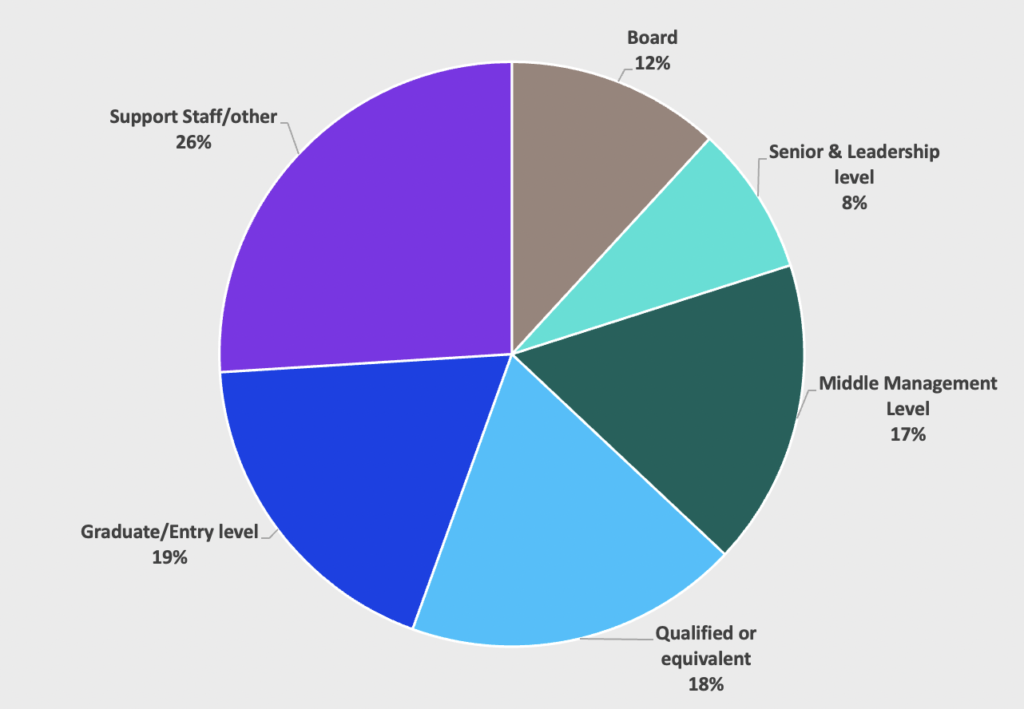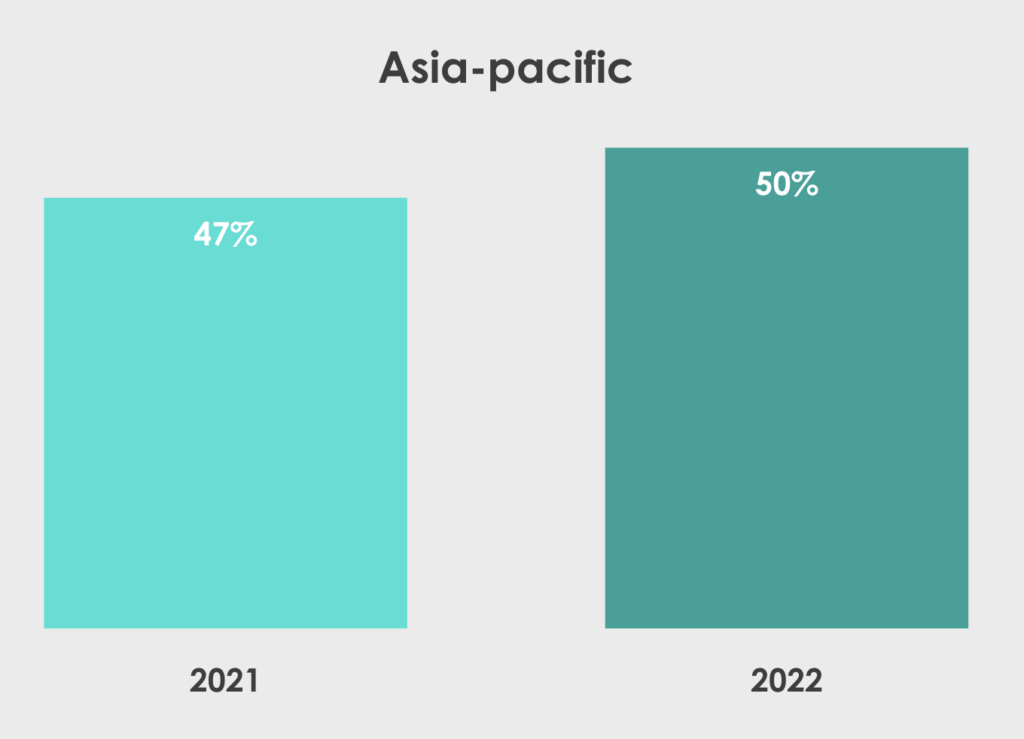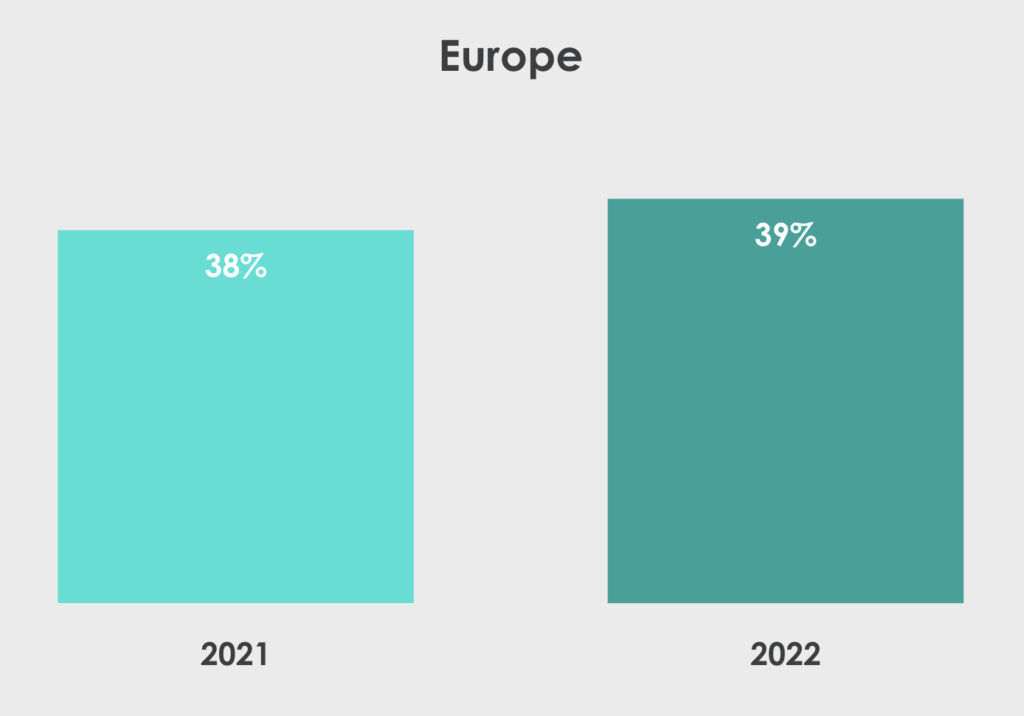A Maya Fink and Clémentine Tanguy collaboration.
Real estate has long been a male landscape with little or no female representation. In recent decades, from real estate agents to brokers, to buyers, women have played a larger role in the leadership of the various real estate sectors. Lack of parity in the professional world is not new, and real estate is no exception to the rule. This International Women’s Day, Deepki challenges the real estate sector with the following question: where do we stand on gender parity?
For decades women have been fighting and are still fighting for their equal rights. Today, the movement has become the foundation for inclusivity across a wide spectrum of intersectionality, taking on a fight for women and other identities whose rights are also underrepresented. International Women’s Day celebrates not only gender equality but also the collective effort of all. Gloria Steinem, world-renowned feminist, journalist and activist, explained, “The story of women’s struggle for equality belongs to no single feminist nor any one organization but to the collective efforts of all who care about human rights“(Developmental Disabilities Institute).
In 1908, terrible working conditions, exploitation, and political inequalities pushed 15,000 women to protest in New York, looking for shorter hours, better pay, and voting rights. It wasn’t until 1975 that the United Nations adopted International Women’s Day on March 8th to remember the discrimination, harassment, inequality and oppression women experience and still live through (International Women’s Day 2023 | IWDA).
Today, women hold over 40% of commercial real estate positions worldwide. Even with these large steps forward, it’s important to remember that there are still many challenges the industry needs to overcome (Jonsson). Pay gaps and a low number of female representatives in high-profile job positions are just some of the topics left to be addressed. These issues are not only directly relevant to the real estate industry but also important to adopt as part of the ESG framework that the industry has become well versed in. By looking at corporations in real estate that have been successful in mitigating these positive changes, we can collectively pitch in on this bigger fight for both gender and environmental equality.
Women in leadership roles
One of the important outcomes of the last two conferences of the parties (COP) was to increase the equal participation of women, whose voice is an important aspect of mitigating climate action. Ensuring meaningful gender representation and responsible means of implementation are vital to achieving climate goals. Promoting women’s leadership and equity in climate action means turning to experts who can speak about the issues and who have solutions to suggest. How we implement more women-led decisions denotes placing women in these leadership positions, not only C-level ones but also political roles that allow them to make suggestions that put women’s needs at the forefront of the issue. Studies have shown the positive impacts of women-led decisions, and thus the perspectives that women bring to the conversation should start becoming a necessity for our future growth in climate change mitigation.
“By ensuring the meaningful participation of women with diverse backgrounds in relevant decision-making processes, particularly in positions of political authority, have been shown to lower national carbon footprints.” Marketa Simkova, Partner and Head of People and Change at KPMG, says, “More and more women are leading climate solutions – whether this is through building resilience, scaling environmental protection, or finding innovative ways to cut emissions”(DCunha et al.).
We have come a long way since 1908, but not all the solutions have been going. Climate change, for example, increases violence against women and girls, according to the IUCN study in 2020. The case study documented that domestic abuse, human trafficking, sexual assault and general violence against women were increased due to the degradation of nature. “Women are positive agents of change. They are 50% of the world’s population, and their lack of representation debilitates climate action,” says Samar Alshorafa, founding CEO of She is Arab. “Just as we say when it comes to women’s economic inclusion and how there’s an opportunity cost for the lack of it, and how it negatively affects a country’s GDP, the same applies to climate change. There is a positive correlation between climate change and gender inequality” (DCunha et al.).
Read more: The “I”(nclusivity) in DEI
Feminism and the environment
The recent climatic events have challenged the current systems of power to find solutions for creating a better planet for all. Looking at the situation from a feminist lens proves that gender inequality is related to human impact on biodiversity losses. Feminism has been mostly known for its fight for women’s rights, but branches of feminism have begun to expand and encompass all genders and races. The main philosophy underlying women’s rights depends on diversity and inclusion as a whole.
Applying a feminist lens to social issues considers all groups that may have been marginalized – the groups often referred to as the “other”. Racism is not the only concept adopted by feminists; “environment” is a concept that has also been taken into account – the environment has been feminized (“Mother Earth”), demonstrating the connection we perceive between nature and women. Similar to the human rights activist fighting for gender equality, the environment has also been seen by humans as something to be objectified, dominated, and conquered. Sometimes referred to by Ecofeminists as the “other”, the commonality between women and the environment is that both are victims of the patriarchal system the world has been operating under for many years.
It is, therefore, crucial that our efforts to mitigate climate change are aligned with the efforts used to mitigate gender inequality. In doing so, it’s pertinent to involve the voices and experiences of women (and other marginalized identities). Mary Robinson, the first female president of Ireland and climate activist, tells us that “climate change is a man-made problem with a feminist solution” (Phillips).
With the current data, we can see the obvious link between gender and climate change. We recognize that without gender equity, a sustainable future and an equal one are out of reach. Gender equality is important to ensure getting a 360 view of the problem and finding more productive and accurate solutions to the climate crisis.
It is also important to determine the steps towards social equity that are inclusive of the different genders and unique to their differing experiences. For example, women and girls in certain regions of the world experience greater impacts of climate change, thus amplifying the already-existing gender inequalities that put these women at risk. Some women depend more on natural resources, often bearing the responsibility of securing food, water and fuel. Women with less access to these natural resources could be at a higher risk of negative impacts, so mitigating climate change must necessarily consider these factors in its strategy.
Without a proper model that is inclusive of the problems women face worldwide, a solution for mitigating climate risk falls short of being long-lasting. As women and girls bear the burden of climate change, it’s also essential for them to have a seat in driving the change of climate adaptation, mitigation and solutions that ensure the equality of both women and the environment.
Read more: Earth Overshoot Day: our yearly ecological deficit starts today
Women in real estate
Women are just beginning to be included at the table of commercial real estate, but female leaders agree that there is still work to be done to achieve true gender diversity. We spoke with some of Deepki’s leaders to find out how far the sector has come, what issues still need to be addressed, and how industry leaders are responding. Although there is so much more progress to be seen, it’s clear that women in real estate sectors around the world are breaking through the glass ceiling more than ever before.

In the UK, Real Estate Balance’s 2020 survey revealed that between 2016 and 2020, women represented approximately 40% of the workforce in the real estate industry for graduate entry-level to middle managers. However, at middle management and senior levels, the numbers fell dramatically (although they did recover somewhat at the board level). Survey respondents called for ‘less talk and more action’.

In North America, a slight improvement has been seen in recent years. A 2022 study was led by the National Association of Real Estate Investment Managers (NAREIM) and included participation from 192 unique companies, representing more than 375,041 full-time employees in a cross-section of diverse commercial real estate companies, sectors and locations. The study found that in North America, women now make up 42.5 percent of the commercial real estate workforce, a 3.7 percent jump from 2021. There was also a slight increase in Black and African-American women in the sector, to 3.7 percent, up from 3.1 per cent the previous year.
The study found that 95 percent of the companies surveyed were addressing diversity, equity and inclusion (DEI) issues, and nearly nine out of 10 companies had set specific quantitative or qualitative goals to measure their success. However, according to the Workplace report from McKinsey & Company, women leaders, in general, are more than 1.5 times more likely than men at their level to have left a previous job because they wanted to work for a company with a greater commitment to DEI. (Sahadi).


Xana Muñiz, Head of Deepki Iberia & Latam, studied at the Law University of Oviedo, following the Education program, Strategic Negotiations of the Harvard Business School, has worked in multiple countries around the world, such as Mexico, Haiti, and Sweden.
In regards to positions occupied by women in the real estate industry, she says, “The real estate sector has been historically a male sector. However, the representation of women has increased progressively during the last few years. Still, even if we see how there are more senior management positions covered by women, it is necessary a greater presence of women as CEOs and on boards. It would greatly contribute not only to the further development and growth of real estate but also to breaking down stigmas that still persist in society”. As Chart 1 shows, 26% of the women from the survey occupied support positions while only 8% occupied senior or Leadership leader roles – an 18% marginal difference.
Muñiz believes that we “must make a commitment to create and make visible women leaders and managers because it is very difficult for girls to become what they cannot see. To me, companies have a major responsibility to give opportunities to women in visible positions, not just in senior management ones but in top management and boards. I am convinced that including women in all these layers of organizational structures adds value because it creates stronger teams and enriches company management. It is crucial to encourage their participation in company decision-making bodies”.
Watch more: Katie Whipp speaks about International Women’s Day with SIOR
Importance of women in real estate
Women have long been advancing toward equality in the sector and, in many ways, are now reaping the benefits of those early efforts. The biggest step forward has been taken by women in leadership positions, and these women are helping to move the next generation forward.
“The real estate industry is taking action to improve its environmental performance, but it is important that the social aspect of ESG is also addressed,” says Caroline Tailleferd, Chief Marketing Officer at Deepki. She joined the Deepki team in 2021 as a unique opportunity to combine her affinity for data and SaaS with her personal values and commitment to the environmental transition. “I’m proud to work for a company that practices what it preaches, as demonstrated by Deepki’s recent score of 99/100 in the “Professional Equality Index” (Index de l’Egalité Professionnelle). This Index takes into account pay discrepancy, differences in raises, and parity among the highest earners. It is vital to keep track of these KPIs in order to gain insight into equality within all companies and sectors and to make sure we continue striving for improvement. We mustn’t be complacent, there is still work to be done!”
The real estate sector is mobilizing to advance parity. With this in mind, the “Cercle des Femmes de l’Immobilier” in France launched a charter for parity in real estate in March 2022. More than 120 companies and organizations have agreed to the Charter’s proposals. It is based on an in-depth study of the real estate industry’s practices in terms of recruitment and retention of talent. The survey conducted by the “Observatoire de la Parité en Immobilier” (Observatory of Parity in Real Estate) at the end of 2022 among 87 companies in the real estate sector, signatories of the “Charte de la Parité” (Charter on the Parity), has established an initial overview.
The majority of their staff are women, with 51.7% of female employees compared to an average of 50% in France for all sectors combined. However, this is not the case for management. In fact, within the ComEX-CoDir, there are, on average, 3 women for every 5.5 men. Moreover, 26% of companies have no women in their management bodies. How can we explain this low representation of women in management bodies?
Men’s unconscious prejudices can be a barrier to women’s professional development. They tend to favor candidates with similar profiles for promotions. In fact, they recognize more leadership and skills in men. Moreover, when it comes to promotion, the lack of female candidates for certain positions does not encourage the search for women with equal skills. Women may also be held back by their own: lack of desire for promotion, lack of self-confidence, fear of failure, or fear that motherhood will slow down their progress in the company.
“When changing positions or getting interviewed, I faced obstacles being a woman, specifically in my 30’s,” says Sigrid Duhamel, newly appointed Independent member and Chairwoman of Deepki’s Strategic Committee. “In my career, when I looked at jobs, some people wondered why I needed to work if I was happily married. I have been asked if I needed to. Concerning children, it did block me on a particular occasion. Once, there was a big project that fell under the scope of my responsibilities, but I was not given this project to manage because they were concerned I would not be able to fully dedicate myself to the task because I had children. That was extremely frustrating.”
She adds, “in terms of maternity leave, people are simply more dedicated when they feel they’re being taken care of. I even convinced my husband to give long maternity leave to his team members when they needed it and to really make sure they didn’t feel any pressure. It’s management – it’s one extra thing to manage in the short term that translates into the well-being of the person and hence commitment and retention in the long term”
Xana Muñiz echoes some of the same challenges “I believe women need to prove more to be recognized, and I think it happens in any sector. There have been challenges, but I am convinced that tenacity and perseverance have helped to achieve the goals pursued”. In regards to Deepki, Muñiz, who joined the company in 2019, says she is “proud to lead Deepki Iberia & LATAM”, with ⅘ country managers being women, it’s clear that Deepki is making conscious efforts to diversify its team.
Muñiz continues, “First of all, to me, it is great to work in this adventure with amazing female leaders who are the other two country managers in Deepki. The role of a country manager is to lead and represent the business in a particular territory and to expand the business of the company in new territories and make it grow, it means it is a relevant role to make a company global. In this sense, it is positive that Deepki has this 4/5 of women representation at the country and regional management level. However, there is also room for improvement. For instance, the executive committee has just 22% female representation, and up to the five most relevant positions in a tech company, any of them is represented by a woman”.
Read more: Earth Day: Why ESG should start with your team
Towards parity
How can we improve parity in the sector? According to Sigrid Duhamel, who has been active in the real estate sector in a wide spectrum of functions ranging from construction to international real estate development, corporate real estate and investment management in Europe, “education and training should be taken into account. This starts with engineering schools, where women simply aren’t entering the sector. It must be made attractive to women from the start. We must increase the number of possibilities and studies that one can do to enter the real estate sector. It needs to appear as an attractive sector for women. It’s been too masculine for too long.”.
A second major aspect is salary equality. “In France, this is monitored by the law, but it’s not sufficient,” says Duhamel. “We shouldn’t need the law to ensure salary equality for women and men. The difference is quite significant from the start. The salary really is in the hands of the company itself. I still wonder how we can often have such a difference in the same job with the same experience. Why is there not the same financial compensation? It should be continuously monitored. I’m not only talking about C-level positions, although it’s particularly true in these cases.”
DEI is not just a nice to have…
Gender diversity is not just about having women in the sector or leadership positions. Indeed, DEI is not just a “nice to have”; we should be considering the framework as a “must have” if we’re serious about positive change. Diversity also requires a corporate and industry culture based on acceptance and collaboration, which is also beginning to emerge. “Now that ESG is becoming a strategic topic in the boards, those departments and those women have a great opportunity to gain visibility within their business,” says Xana Muñiz, “I encourage all and the new ESG women profiles to take advantage of the momentum”.
Organizations need to continue to focus on DEI initiatives to build a more diverse, equitable, and inclusive workforce. The presence of women as country managers at Deepki also illustrates the increasing presence of women throughout the industry and their importance to progressing the fight against climate change. Duhamel concludes, “as far as I have seen in the ESG, there are a lot of women. It’s a topic that interests them. The sector is new; it’s growing, so there shouldn’t be any inequality. On the contrary. This really can be open to women“.



